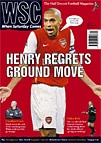 Indoor football is largely a form of exercise in this country but, as Steve Menary reports, the version known as futsal is a sport in its own right abroad. Can the UK’s FAs catch up?
Indoor football is largely a form of exercise in this country but, as Steve Menary reports, the version known as futsal is a sport in its own right abroad. Can the UK’s FAs catch up?
In three years, England have not won a game and only avoided defeat once. Even that was a 5-5 draw against Cyprus after being three goals ahead.
European Championship qualifiers are coming up against Romania, Latvia and Bulgaria, but qualification is extremely unlikely as England can’t even use players from the Football League, let alone the Premiership.
That is not a nightmare version of the future but the lot of Graeme Dell, formerly a coach at Wycombe and Queens Park Rangers and now manager of England’s futsal side. “People see the results but don’t understand the context,” says Dermot Collins, national manager of small-sided football at the FA. Five-a-side is outpacing the 11-a-side version of football in the UK but futsal is not this country’s standard five-a-side. The goals are larger – more like handball or field hockey – and there are touchlines so the ball goes out of play, and it can also go over head height. There are two referees and a team has a penalty awarded against them after every five fouls. Collins adds: “Tactically, it’s like basketball. Every time the keeper picks up the ball that leads to a play that should lead to a shooting opportunity.”
The Futsal FA Cup has run for four years and 40 qualifying leagues will be contested to provide 16 qualifiers for this year’s fifth final round in Sheffield in July, where the winner also gets a berth in the UEFA Futsal Cup. A spot in that competition persuaded the Welsh FA to launch a knockout cup last year, but no UK FA has a national league. Neither has Germany, but futsal is hugely popular in much of Europe. UEFA estimates there are six million regular players in their jurisdiction and there are professional leagues in Iberia and eastern Europe, where harsh weather drives players indoors for long periods in the winter. Even Malta has four futsal leagues.
England’s representatives in last year’s UEFA Futsal Cup, Doncaster, lost all three qualifiers, including 8-2 and 10-2 pastings by the representatives of Andorra and Moldova respectively. Ranked 61 in the world, the England team fares even worse. A recent visit to Poland – number 17 in the world – for two matches was watched by capacity crowds of 5,000 and screened live on satellite TV, but thankfully not in the UK as England went down 9-2 and 16-0.
The FA are trying to catch up but are hindered on all fronts, with the rollout of five-a-side centres far outstripping facilities for futsal. Dell instituted the F30 development programme to bring players through but, with League clubs unwilling to release players, he is reliant on semi-pro players and fixtures are usually arranged during gaps in the non-League schedule. He gets only one day a month to work with his squad, which includes Alex Haddow, now at Salisbury City but best known for inspiring Slough to an FA Cup win against Walsall two seasons ago, and Steve Torpey, once at Liverpool but now in the Conference with Halifax.
The Olympics could make a difference. FIFA want futsal in the world’s biggest sporting event and had Madrid won the 2012 bid then futsal would likely have featured, as Spain are world and European champions. The FA have considered pushing for a place for futsal in the London Games, but want a national league first. Collins says: “We’ve looked at European leagues and other sports like basketball. We’d like to grow it with a conference north and south of six teams each and the top four, say, going through into play-offs for a place in the UEFA Cup. We’re looking for clubs with a structure in place to give it sustainability, maybe with local authority involvement but preferably not franchises. We’ve set ourselves a target of doing something by the end of 2007, but sponsors need to be found.”
What also hinders the national team’s chances of progress is the make-up of existing clubs. Last year’s FA Cup winners, London White Bears, are Russian emigres, while the other semi-finalists were stuffed with players from Portugal and Brazil, where futsal is equally popular. “That reflects the roots of the game,” sighs Collins.
Steve McClaren might not enjoy the opprobrium heaped on him, but if the England coach wants to know real pressure he should walk down the corridor in Soho Square and see Graeme Dell.
From WSC 239 January 2007. What was happening this month